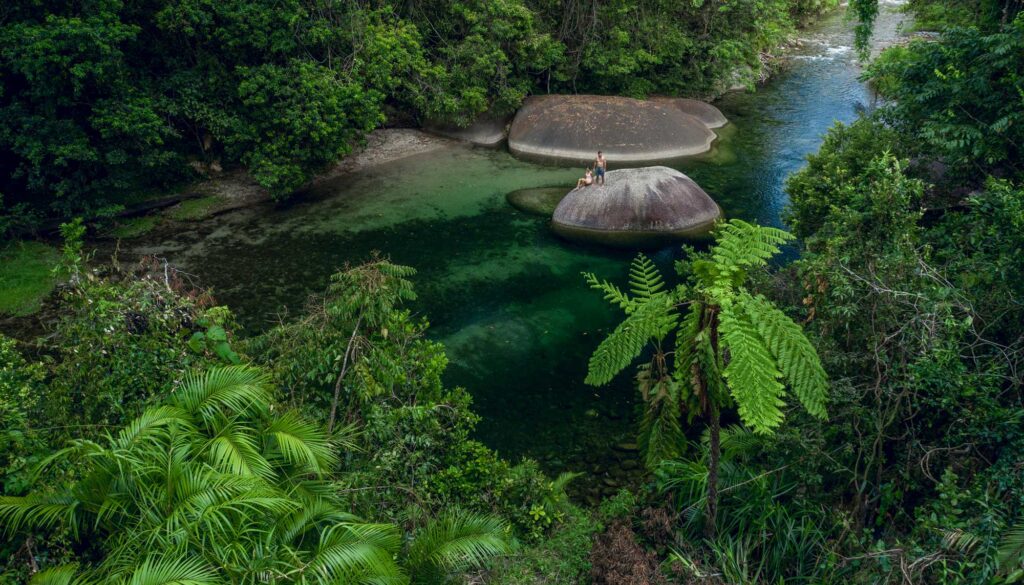Queensland, Australia, renowned for its stunning landscapes and diverse wildlife, offers a myriad of opportunities for eco-friendly tourism. The state is a natural playground where lush rainforests meet pristine beaches, offering visitors a chance to connect with nature in sustainable and responsible ways. Whether you’re interested in snorkeling along the Great Barrier Reef or hiking through ancient rainforests, Queensland presents eco-conscious travelers with numerous options that focus on conservation and sustainability.

The Natural Wonders of Queensland
Queensland is home to some of the world’s most celebrated natural wonders, making it a top destination for nature lovers. One of the most iconic eco-tourism spots is the Great Barrier Reef, a UNESCO World Heritage site and the largest coral reef system on Earth. Its biodiversity is unparalleled, and eco-friendly tourism in the area is centered around preservation. Visitors can engage in snorkeling and diving experiences with eco-certified operators who prioritize reef conservation. From reducing water pollution to practicing safe snorkeling techniques that minimize harm to coral, many tour companies emphasize sustainable interaction with the marine ecosystem.
Another natural marvel is the Daintree Rainforest, the oldest tropical rainforest in the world. Situated in the northern part of Queensland, the Daintree is a treasure trove of unique flora and fauna. Visiting this rainforest with eco-conscious guides ensures that tourism doesn’t negatively impact its delicate ecosystem. Guided tours educate visitors on the importance of conservation while offering an immersive experience within one of the most biologically diverse areas on the planet.
Sustainable Accommodation Options
Eco-friendly tourism in Queensland extends beyond attractions to include sustainable accommodation options. Across the state, you’ll find eco-lodges, cabins, and resorts designed with the environment in mind. These properties typically utilize renewable energy sources, like solar power, to reduce their carbon footprint. Many are constructed from sustainable materials and incorporate water-saving techniques such as rainwater collection and greywater recycling. By choosing eco-certified accommodations, travelers can be sure that their stay supports local conservation efforts.
One such option is located in the heart of the Sunshine Coast Hinterland, where eco-retreats offer a tranquil escape within nature. These retreats are often set in secluded areas surrounded by native forests, allowing visitors to connect with Queensland’s natural beauty without harming the environment. Guests can indulge in farm-to-table dining experiences, where food is sourced locally to support sustainable agriculture.
Responsible Wildlife Encounters
Queensland offers numerous opportunities to engage with native wildlife responsibly. Wildlife sanctuaries and rehabilitation centers across the state emphasize conservation and education, offering visitors a chance to learn about the importance of preserving Australia’s unique animals. Sanctuaries like Currumbin Wildlife Sanctuary on the Gold Coast focus on the protection of endangered species while providing up-close encounters in a manner that supports wildlife conservation. Visitors can participate in animal care experiences that help fund rehabilitation efforts for injured or displaced animals.
Another great destination for wildlife enthusiasts is the Fraser Coast, where you can embark on a whale-watching tour during the migration season. Eco-certified whale-watching tours provide educational insights into marine conservation while ensuring the safety and well-being of the whales. These tours operate with strict guidelines to prevent disruption to the whales’ natural behavior, allowing for an enriching experience that benefits both the animals and tourists.
Eco-Tours and Cultural Experiences
Eco-friendly tourism in Queensland isn’t limited to its wildlife and landscapes. Cultural experiences with indigenous communities offer a rich, immersive way to learn about the traditional custodians of the land. Many indigenous-led tours provide insights into the spiritual and cultural significance of Queensland’s natural landmarks, enhancing travelers’ understanding of the connection between people and the environment.
On a cultural eco-tour, visitors can explore sacred sites like Mossman Gorge, where they learn about the history and traditions of the Kuku Yalanji people. These tours often incorporate elements of bushwalking, storytelling, and hands-on experiences with traditional bushcraft. Supporting indigenous tourism also contributes to the protection of cultural heritage and helps empower local communities.
Promoting Sustainable Travel in Queensland
Traveling in an eco-friendly way means being mindful of how you impact the environment and communities you visit. In Queensland, this can include choosing low-impact transportation methods, such as biking, hiking, or using public transport instead of renting cars. Many regions in Queensland are increasingly providing facilities that support eco-friendly travel, such as bike paths and shuttle services to reduce vehicle emissions in popular tourist areas.
Moreover, responsible tourists can contribute to conservation by participating in activities like beach cleanups or supporting local conservation projects. Many eco-certified tour companies work closely with environmental groups and offer volunteering opportunities to tourists. Whether it’s helping to plant native trees, assisting with wildlife rehabilitation, or contributing to marine conservation efforts, these activities allow travelers to give back to the environment and leave a positive impact.

Queensland’s National Parks: A Sustainable Adventure
The state’s numerous national parks are another key attraction for eco-conscious travelers. Queensland boasts over 200 national parks, covering a vast array of ecosystems from coastal dunes to highland rainforests. Popular parks like Lamington National Park offer visitors the chance to explore ancient forests, waterfalls, and diverse wildlife, all while maintaining a commitment to sustainability.
Park authorities ensure that conservation comes first, with visitors encouraged to follow ‘leave no trace’ principles. This includes sticking to designated paths to avoid disturbing habitats, carrying out any rubbish, and being respectful of wildlife. Campsites within these parks are also designed to have minimal environmental impact, allowing tourists to immerse themselves in nature without damaging the fragile ecosystems they’re there to enjoy.
The Future of Eco-Tourism in Queensland
As the global demand for sustainable travel continues to rise, Queensland is setting a standard for eco-friendly tourism by fostering a deeper connection between visitors and the environment. The state’s efforts to balance tourism with conservation are a testament to its commitment to preserving its natural wonders for future generations.
By choosing to travel responsibly in Queensland, visitors not only enjoy some of the world’s most breathtaking scenery but also contribute to the preservation of this incredible region. Through conscious choices, from accommodation and transportation to the activities you engage in, you can play a role in ensuring that Queensland remains a haven for eco-friendly tourism long into the future.
